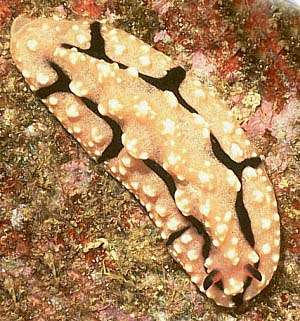
Phyllidiopsis pipeki
Brunckhorst, 1993
Order: NUDIBRANCHIA
Suborder: DORIDINA
Family: Phyllidiidae
DISTRIBUTION
Coral Sea north to Papua New Guinea, Solomon Islands, Philippines, Fiji.
PHOTO
15-25m, Madang, Papua New Guinea, Feb 1988, Dorsal view of 48mm animal. PHOTO: R.C. Willan. (Brunckhorst, 1993: Plate 9A).
Notes from Brunckhorst,1993:
Phyllidiopsis pipeki Large and elongate, growing to 85mm. Bright pink colouration and consistently two black longitudinal lines only. The lines may be broken, and occasionally there can be a few black spots or rays extending to the mantle edge. The large tubercles, either single or compound have a steep pink base and a rounded white tip. They are sparsely scattered over dorsum. The rhinophores are pink with a black tip and a black line down posterior edge.
Two other species with similarly coloured rhinophores:
Phyllidiopsis krempfi, Large species characterised by predominantly pink coloration, and broad based multicompound tubercles with paler apices. Apart from two primary longitudinal black lines, other black lines of variable size occur irregularly. Rhinophores pink on anterior face and around base, black on apex and posterior face.
Phyllidiopsis fissuratus, which is also pink and black but is extremely tuberculate, with very tall compound and coalesced tubercles with deep black valleys between. It also has a translucent raised rim around the raised rhinophore pockets and a smooth tall raised pink anal papilla.
Reference:
• Brunckhorst, D.J. (1993) The systematics and phylogeny of Phyllidiid Nudibranchs (Doridoidea). Records of the Australian Museum, Supplement 16: 1-107.
Rudman, W.B., 1998 (December 12) Phyllidiopsis pipeki Brunckhorst, 1993. [In] Sea Slug Forum. Australian Museum, Sydney. Available from http://www.seaslugforum.net/find/phylpipe
Related messages
Phyllidiopsis pipeki from the Solomons
January 23, 2003
From: Scott Johnson

Hi Bill,
Here is a photo of an animal found at Karumolun in the Solomons' Russell Islands that while similar to both Phyllidiopsis krempfi and Phyllidiella rudmani [8907], did not quite seem to match the specimens of either of those two species that were also found in the Solomons. All three were similar in size, in the 30-40mm range.
Scott
johnson@kmr.LL.mit.edu
Johnson, S., 2003 (Jan 23) Phyllidiopsis pipeki from the Solomons. [Message in] Sea Slug Forum. Australian Museum, Sydney. Available from http://www.seaslugforum.net/find/8909Dear Scott,
I agree it differs from the other two. I suspect this is Phyllidiopsis pipeki
Best wishes,
Bill Rudman
Phyllidiopsis pipeki from NE Sulawesi
August 18, 2001
From: Jim Anderson


Dear Bill,
I have attached the enclosed photo on the prompting of Bernard Picton who thinks it
might look good on the Forum. I have revised my Sulawesi Sea Slug page to reflect this animal as Phyllidiopsis pipeki not Phyllidiopsis shireenae as I previously guessed.
Bunaken, N E Sulawesi, Indonesia. Site: Lekuan 1, Depth: 15 metres. Size approx: 65 mm. 26 June 2001.
Kind regards,
Jim Anderson.
JAnder4454@aol.com
Anderson, J., 2001 (Aug 18) Phyllidiopsis pipeki from NE Sulawesi. [Message in] Sea Slug Forum. Australian Museum, Sydney. Available from http://www.seaslugforum.net/find/5028Thanks Jim,
Its good to get another photo of this species. It looks like someone has given it a little nibble on the back. And congratulations on your Sulawesi Sea Slugs Site.
Best wishes
Bill Rudman.
Phyllidiopsis pipeki from Solomons and PNG
January 31, 2001
From: Mary Jane Adams

Hi Bill,
I believe these four branchs are all Phyllidiopsis pipeki. They are not all bright pink and one has black rays extending medially, however I can't find a better fit. What do you think?
110019 Mary Island, Solomon Islands, Nov. 2000
119714 Mary Island, Solomon Islands, Nov. 1997
50001 Bootless Bay, Papua New Guinea
39829 Milne Bay, Papua New Guinea
Best regards,
Mary Jane
divepng@yahoo.com


Dear Mary Jane,
I am inclined to agree with you but as Brunckhorst says, the dorsal colour and shape of P. pipeki and P. krempfi are very similar, differing mainly in the more numerous compound tubercles in p. krempfi. With that in mind, perhaps 50001 is P. krempfi?
Best wishes,
Bill Rudman
